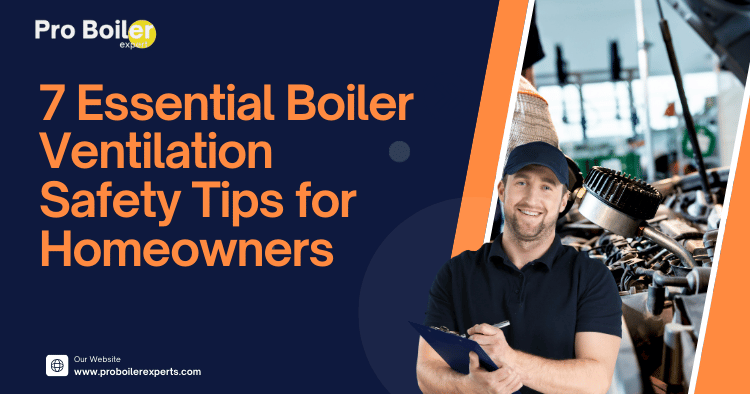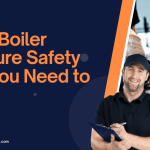Table of Contents
- Understanding Boiler Ventilation
- Tip 1: Ensure Proper Ventilation Space
- Tip 2: Regular Maintenance Checks
- Tip 3: Install Carbon Monoxide Detectors
- Tip 4: Use High-Quality Ventilation Materials
- Tip 5: Seek Professional Installation
- Tip 6: Be Aware of Your Boiler’s Location
- Tip 7: Understand Local Regulations
Boiler ventilation is a critical aspect of home safety that often goes overlooked. Proper ventilation ensures your boiler operates efficiently and reduces the risk of harmful gas buildup. In this article, we’ll cover seven essential tips to help homeowners maintain safe and effective boiler ventilation.
Understanding Boiler Ventilation
Boiler ventilation refers to the process of supplying air to the boiler for combustion and removing exhaust gases from the home. Proper ventilation is vital for preventing carbon monoxide poisoning and ensuring that your heating system operates efficiently. Understanding how your boiler works and the importance of ventilation can help you avoid potentially dangerous situations.
FAQ: What is Carbon Monoxide?
Carbon monoxide (CO) is a colorless, odorless gas produced during the incomplete combustion of fuels. It’s extremely dangerous and can lead to serious health issues or even death if inhaled.
Tip 1: Ensure Proper Ventilation Space
One of the first steps to ensuring boiler ventilation safety is providing adequate space around your boiler. This space allows fresh air to flow into the boiler and exhaust gases to escape.
Key Considerations:
- Follow Manufacturer Guidelines: Each boiler comes with specific installation requirements. Always refer to the manufacturer’s guidelines for ventilation space.
- Avoid Obstructions: Make sure that vents and air intakes are free from obstructions such as furniture or clutter.
Visual Element: Recommended Boiler Clearance
| Boiler Type | Recommended Clearance (inches) |
|---|---|
| Conventional | 24 inches |
| High-Efficiency | 12 inches |
| Combination | 18 inches |
Tip 2: Regular Maintenance Checks
Regular maintenance checks are essential for ensuring your boiler operates safely and efficiently. Schedule professional inspections at least once a year to catch any potential issues before they become serious.
What to Look For:
- Signs of Wear: Inspect components for rust or deterioration.
- Flue Gas Emissions: Check for any unusual emissions that could indicate a problem.
FAQ: How often should I service my boiler?
Most experts recommend servicing your boiler annually to ensure it’s functioning safely and efficiently. For more detailed information, see our guide on essential boiler maintenance tips.
Tip 3: Install Carbon Monoxide Detectors
Carbon monoxide detectors are a must for any home with a boiler. These devices provide an early warning system in case carbon monoxide leaks occur.
Installation Tips:
- Placement: Install detectors near sleeping areas and on every level of your home.
- Maintenance: Test your detectors monthly and replace the batteries at least once a year.
Outbound Link: National Fire Protection Association (NFPA) – for more information on fire safety and CO alarms.
Tip 4: Use High-Quality Ventilation Materials
Investing in quality ventilation materials is crucial for maintaining boiler safety. Poor-quality materials can degrade over time, leading to leaks and other safety hazards.
Recommended Materials:
- Stainless Steel or PVC: These materials are resistant to corrosion and can withstand high temperatures.
- Proper Insulation: Insulating your flue pipes can prevent condensation and improve efficiency. For insights on energy-efficient heating systems, check out our article on top energy-efficient heating systems for your home.
FAQ: What should I avoid when choosing ventilation materials?
Avoid using materials not specifically rated for boiler use, such as standard plastics or ductwork not designed for high-temperature applications.
Tip 5: Seek Professional Installation
When it comes to boiler installation and ventilation, it’s always best to hire a qualified professional. They have the experience and knowledge to ensure everything is set up correctly and safely.
Benefits of Professional Installation:
- Compliance with Regulations: Professionals ensure your boiler meets local codes and regulations. For more on installation regulations, visit our guide on essential building regulations for boiler installations.
- Long-Term Safety: Proper installation reduces the risk of future issues.
Outbound Link: U.S. Department of Energy – for guidelines on hiring professionals for home installations.
Tip 6: Be Aware of Your Boiler’s Location
The location of your boiler can significantly impact its efficiency and safety. Ensure that it’s installed in a well-ventilated area away from living spaces.
Key Considerations:
- Basements and Utility Rooms: These areas often provide sufficient ventilation but should be regularly monitored.
- Avoiding Confined Spaces: Never place your boiler in an enclosed space without adequate ventilation.
FAQ: Can I move my boiler to a different location?
Yes, but it’s essential to consult with a professional to ensure that the new location is safe and complies with local regulations.
Tip 7: Understand Local Regulations
Familiarizing yourself with local building codes and regulations regarding boiler ventilation is critical. Regulations vary by location, and compliance is necessary for safety and insurance purposes.
Steps to Ensure Compliance:
- Research Local Codes: Check with your local building department for the specific regulations in your area.
- Consult Professionals: When in doubt, always consult with licensed professionals who can guide you through the process.
Outbound Link: International Code Council (ICC) – for resources on building codes and standards.
Conclusion
Boiler ventilation safety is an essential aspect of home maintenance that can’t be overlooked. By following these seven tips, you can ensure that your boiler operates safely and efficiently, protecting your home and loved ones from potential hazards. Regular checks, quality materials, and a clear understanding of your local regulations will go a long way in maintaining a safe environment. Remember, when in doubt, always consult with professionals!
For further reading, consider exploring resources from the U.S. Environmental Protection Agency on indoor air quality and boiler safety. Stay safe and warm!
Also, look into the benefits of upgrading to a more efficient boiler system. For tips on the top energy-efficient boiler types, check out our article on top energy-efficient boiler types for 2024.





